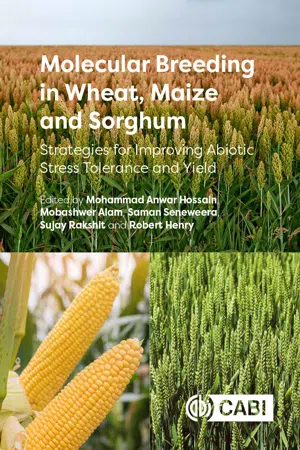
Molecular Breeding in Wheat, Maize and Sorghum
Strategies for Improving Abiotic Stress Tolerance and Yield
- 552 pages
- English
- ePUB (mobile friendly)
- Available on iOS & Android
Molecular Breeding in Wheat, Maize and Sorghum
Strategies for Improving Abiotic Stress Tolerance and Yield
About this book
The global population is projected to reach almost 10 billion by 2050, and food and feed production will need to increase by 70%. Wheat, maize and sorghum are three key cereals which provide nutrition for the majority of the world's population. Their production is affected by various abiotic stresses which cause significant yield losses. The effects of climate change also increase the frequency and severity of such abiotic stresses. Molecular breeding technologies offer real hope for improving crop yields. Although significant progress has been made over the last few years, there is still a need to bridge the large gap between yields in the most favorable and most stressful conditions. This book: - Provides a valuable resource for wheat, maize and sorghum scientists working on breeding and molecular biology, physiology and biotechnology.- Presents the latest in-depth research in the area of abiotic stress tolerance and yield improvements.- Contains the necessary information to allow plant breeders to apply this research to effectively breed new varieties of these crops.It provides a consolidated reference for plant breeders and crop scientists working on the challenges of enhanced crop productivity and climate change adaptability.
Frequently asked questions
- Essential is ideal for learners and professionals who enjoy exploring a wide range of subjects. Access the Essential Library with 800,000+ trusted titles and best-sellers across business, personal growth, and the humanities. Includes unlimited reading time and Standard Read Aloud voice.
- Complete: Perfect for advanced learners and researchers needing full, unrestricted access. Unlock 1.4M+ books across hundreds of subjects, including academic and specialized titles. The Complete Plan also includes advanced features like Premium Read Aloud and Research Assistant.
Please note we cannot support devices running on iOS 13 and Android 7 or earlier. Learn more about using the app.
Information
1 Recent Understanding on Molecular Mechanisms of Plant Abiotic Stress Response and Tolerance

1.1 Introduction
1.2 Molecular Mechanisms of Abiotic Stress Response and Tolerance
1.2.1 Drought stress
Table of contents
- Cover
- Title page
- Copyright
- Contents
- About the Editors
- Contributors
- Preface
- 1 Recent Understanding on Molecular Mechanisms of Plant Abiotic Stress Response and Tolerance
- 2 Breeding Strategies to Enhance Abiotic Stress Tolerance and Yield Improvement in Wheat, Maize and Sorghum
- 3 Recent Advancement of Molecular Breeding for Improving Salinity Tolerance in Wheat
- 4 Genomics and Molecular Physiology for Improvement of Drought Tolerance in Wheat
- 5 Molecular Breeding for Improving Heat Stress Tolerance in Wheat
- 6 Molecular Breeding for Improving Waterlogging Tolerance in Wheat
- 7 Molecular Breeding for Improving Aluminium Resistance in Wheat
- 8 Molecular Breeding for Enhancing Iron and Zinc Content in Wheat Grains
- 9 Recent Advancements of Molecular Breeding and Functional Genomics for Improving Nitrogen-, Phosphorus- and Potassium-Use Efficiencies in Wheat
- 10 Molecular Breeding for Improving Yield in Wheat: Recent Advances and Future Perspectives
- 11 Tools for Transforming Wheat Breeding: Genomic Selection, Rapid Generation Advance and Database-Based Decision Support
- 12 CRISPR-Mediated Gene Editing in Wheat for Abiotic Stress Tolerance
- 13 Application of Pangenomics for Wheat Molecular Breeding
- 14 Recent Advancement of Molecular Understanding for Combating Salinity Stress in Maize
- 15 Isolation of Genes/Quantitative Trait Loci for Drought Stress Tolerance in Maize
- 16 The Genetic Architecture and Breeding Towards Cold Tolerance in Maize: Review
- 17 Physiological and Molecular Mechanisms Underlying Excess Moisture Stress Tolerance in Maize: Molecular Breeding Opportunities to Increase Yield Potential
- 18 Recent Molecular Breeding Advances for Improving Aluminium Tolerance in Maize and Sorghum
- 19 Physiological and Molecular Interventions for Improving Nitrogen-Use Efficiency in Maize
- 20 Recent Advancement in Molecular Breeding for Improving Nutrient-Use Efficiency in Maize
- 21 Molecular Breeding for Increasing Nutrition Quality in Maize: Recent Progress
- 22 Molecular Breeding for Improving Yield in Maize: Recent Advances and Future Perspectives
- 23 CRISPR-Mediated Genome Editing in Maize for Improved Abiotic Stress Tolerance
- 24 Molecular Breeding for Combating Salinity Stress in Sorghum: Progress and Prospects
- 25 Quantitative Trait Locus Mapping and Genetic Improvement to Strengthen Drought Tolerance in Sorghum
- 26 Improving Abiotic Stress Tolerance to Adapt Sorghum to Temperate Climatic Regions
- 27 Isolation of Quantitative Trait Loci/Gene(s) Conferring Cadmium Tolerance in Sorghum
- 28 Molecular Breeding for Increasing Micronutrient Content in Sorghum
- 29 Ideotype Breeding for Improving Yield in Sorghum: Recent Advances and Future Perspectives
- Index